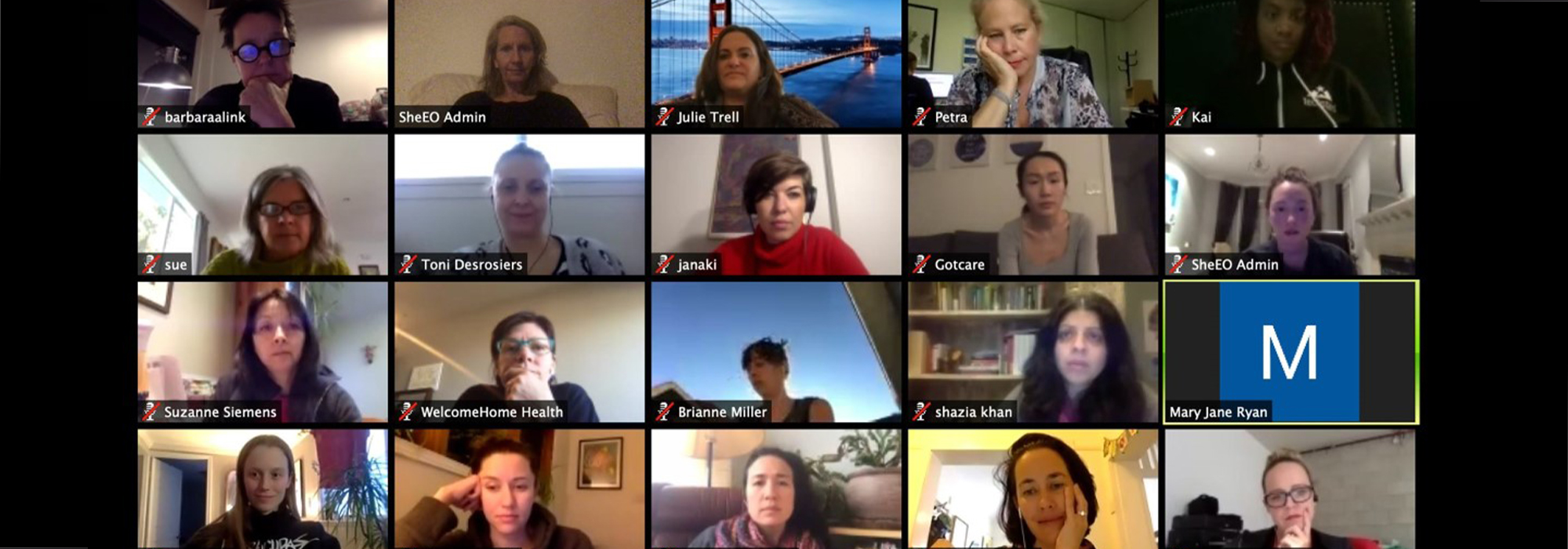
On Monday night, as businesses across the country ground to a halt, a group of dozens of women who own small businesses in communities across Canada gathered for a conference call to share support.
We took turns describing the threat COVID-19 poses to the businesses we’ve poured our savings and lives into. For most, the coronavirus has suddenly pushed our normally healthy business risk levels into the red zone. Our companies, which are in a wide range of industries, are grappling with a cash-flow crisis that could lead to their failure within months, if not weeks.
These are businesses that in normal times are profitable and growing. They are leading the way by creating socially and environmentally sustainable jobs: our companies pay a living wage, and we hire people with barriers to employment to create cutting edge innovations like zero waste grocery stores, toys that teach empathy and Indigenous-centred wellness products, for example.
Many small businesses across Canada, not just the ones run by women, are vulnerable to unexpected challenges. Women entrepreneurs face particular challenges, however. We know that women-led small businesses are significantly under-capitalized compared with other companies, and they are more vulnerable to failure as a result of an interruption of business or a significant revenue decline. Moreover, as the Canadian Women’s Foundation has shown, the implications of COVID-19 disproportionately impact women because we already experience a gender pay gap, and we carry a disproportionate load of unpaid caregiving and household duties.
While Wednesday’s aid package will help businesses that have cash reserves to make it through a slowdown, it will not prevent massive layoffs in undercapitalized small businesses like ours. With $27 billion in aid and $55 billion in tax deferrals, this package gives two-thirds of the support to the companies that are better prepared to deal with the current situation. Tax deferrals are more helpful for large, very profitable companies that have more access to financing options than they are for small companies with narrower margins and challenging financing. Research has shown that trickle-down economics does not work, even long-term, never mind in a short-term emergency situation like this.
The number one concern that came up in our Monday call was, how will we pay our people? Many of our small businesses will be able to withstand an interruption in business if we can also interrupt our biggest expense, labour. But a 10 percent payroll subsidy is not nearly sufficient for us to retain employees and avoid layoffs.
We’re encouraged to see that the direct support for workers includes increases to the child tax credit and support for those who are not eligible for EI. Our employees can’t live in cities like Vancouver and Toronto on the 55 percent of their wages provided by EI, and we don’t want to leave them out in the cold if we’re forced to lay them off. So this safety net does give us some comfort.
But we don’t want to resort to layoffs. We would be disassembling fully trained, functional teams that we need in normal times, and then we would be shouldering the cost of recruiting and training employees when the time comes to put our teams back together.
We need more wage relief, something like the 75 percent subsidy for up to three months announced by Denmark, to guarantee our workers’ incomes and protect sustainable jobs. If we can hold on to them through this temporary interruption in business, that will solve most of the problem for us. Call it trickle-up economics.
It’s now clear that the economy is likely to halt for at least a couple of months. If companies are to come out the other side alive, they need a breather, too. The best way for the government to support us while keeping consumers spending is to guarantee workers’ incomes, so that businesses get relief from supplying that income.
Companies that were viable and growing before the crisis can be again afterward. If they can retain their personnel the economy can be restarted, like flicking a switch. By supporting workers, we’ll avoid taking apart the teams that are the engine of our economy.
Increasing our access to debt won’t solve this problem. We need to allow our staff to comply with the social-distancing directives of our provincial health authorities without bankrupting themselves or our companies. Many small businesses already carry debt loads they can barely manage.
In the same way that we’re all practicing social distancing to protect those who are most vulnerable to COVID-19 in our communities, we need to focus stimulus efforts to prevent the failure of the most vulnerable part of our economy: our small businesses, especially those that are undercapitalized, such as women-owned companies.
An economic package that will ensure that businesses like ours survive by enabling us to help our workers will help all small businesses, as well as the employees and communities we serve.
The following people contributed to this article:
BE Alink, The Alinker
Sheena Russell, Made With Local
Valerie Song, AVA Technologies Inc.
Margaret Magdesian, Ananda Devices
Hayley Mullins, Joeyband
Devon Fiddler, SheNative Goods
Monique Cherrie, Makeshift Work Space
Brianne Miller, Nada
Patrice Mousseau, Satya Organics
Suzanne Tyson, HigherEdPoints.com
Sonia Strobel, Skipper Otto
Emily Bland, SucSeed
Ilana Ben-Ari, Twenty One Toys
Elize Shirdel, HELM Life
Brandi Schier, Sun Peaks Independent News
This article is part of the The Coronavirus Pandemic: Canada’s Response special feature.
Photo: Dozens of women entrepreneurs went online this week to discuss how they could help one another’s businesses survive COVID-19. Courtesy of Erin Millar
Do you have something to say about the article you just read? Be part of the Policy Options discussion, and send in your own submission. Here is a link on how to do it. | Souhaitez-vous réagir à cet article ? Joignez-vous aux débats d’Options politiques et soumettez-nous votre texte en suivant ces directives.











